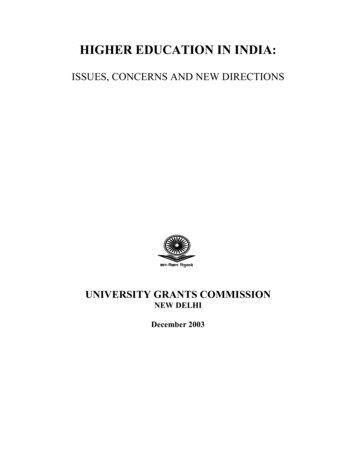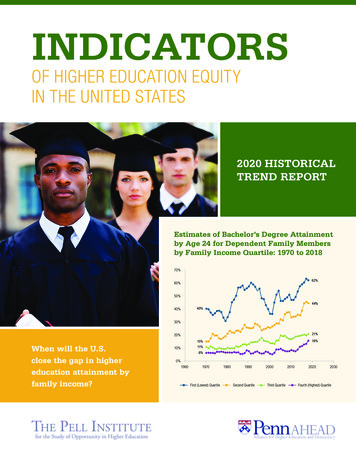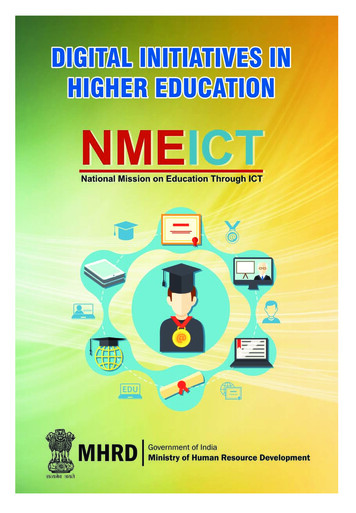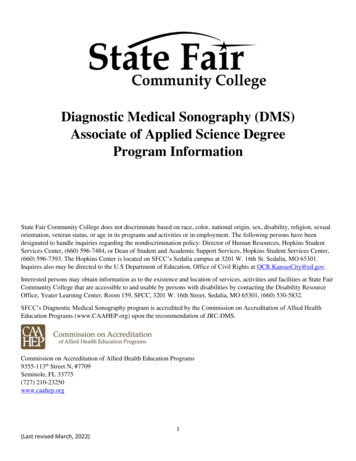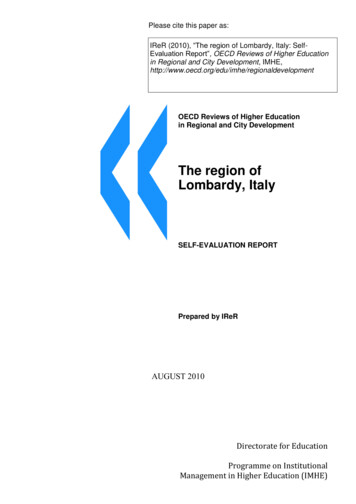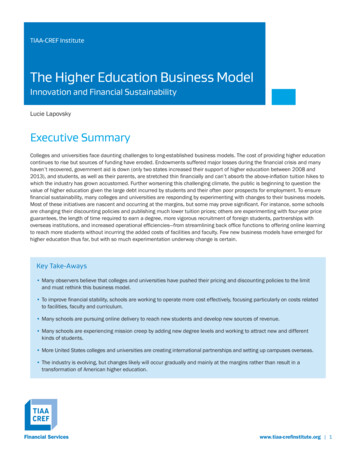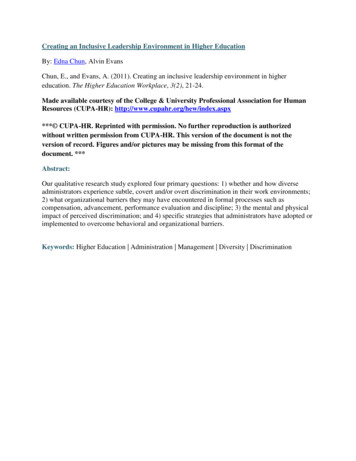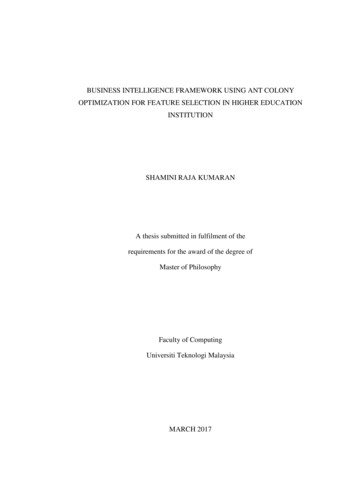
Transcription
1
Department of Higher Education and Training123 Francis Baard StreetPretoriaSouth AfricaPrivate Bag X174Pretoria0001Tel: 0800 87 22 22Published by the Department of Higher Education and Training Department of Higher Education and Training, 2018The ideas, opinions, conclusions and policy recommendations expressed in this report are strictlythose of the authors and do not necessarily represent those of the Department of Higher Educationand Training (DHET). The DHET will not be liable for any content or syntax errors, or for the accuracyof the information contained in this report.This publication may be used in part or as a whole, provided that the Department of Higher Educationand Training is acknowledged as the source of information. Kindly therefore, cite the work as follows:Department of Higher education and Training (DHET). (2018). The 5th Annual DHET ResearchColloquium on Radically Transforming TVET Colleges Through Empirical Research: ColloquiumProceedings Report. Pretoria: DHET.ISBN: 978-1-77018-843-3This report is available on the Department of Higher Education and Training’s website:www.dhet.gov.zaEnquiries:The Director: Policy, Research and EvaluationTel: 27 (0) 12 312 5297Email: dhetresearch@dhet.gov.zai
The 5th AnnualDHET Research ColloquiumonRadically Transforming TVET Colleges through EmpiricalResearch:Colloquium Proceedings Reportii
CONTENTSACKNOWLEDGEMENTS . vACRONYMS . viiiBACKGROUND . 1DAY 1: 12 SEPTEMBER 2018 (WEDNESDAY) . 31. SESSION 1: OPENING . 31.1 Welcome and Opening Remarks. 31.2 Unleashing the Potential: Transforming TVET for Sustainable Development . 51.3 Plenary Discussion . 72. SESSION 2: QUALIFICATIONS AND CURRICULA AT TVET COLLEGES . 92.1 Making Sense of Public TVET Offerings – What Can Research Tell Us?. 92.2 Under-, Over-, and Half-Qualified TVET College Lecturers in South Africa: Can ContinuingProfessional Development (CPD) Give Us Some Answers? . 112.3 Plenary Discussion . 133. SESSION 3: CONTINENTAL PERSPECTIVE . 153.1 Rethinking TVET Policy Reforms and Practices in Africa: What are the Missing Links? . 153.2 Plenary Discussion . 184. SESSION 4: EMPLOYABILITY . 204.1 Pathways to Employability for Technical Occupations: The Harambee Installation, Repair andMaintenance (IRM) Initiative . 204.2 Tracer Studies: National Curriculum (Vocational) [NC(V), Artisans and NationalAccredited Technical Education Diploma (NATED) . 224.3 Evaluation of the Third National Skills Development Strategy (NSDS III): Findings on the Role ofthe Public TVET Colleges during the First Five Years of Implementation . 244.4 Plenary Discussion . 274.5 Closure . 28iii
DAY 2: 13 SEPTEMBER 2018 (THURSDAY) . 295. SESSION 5: TEACHING AND LEARNING FOR IMPROVED EMPLOYABILITY AND WORK INTEGRATEDLEARNING (WIL) AT TVET COLLEGES . 295.1 The Relationship between Lecturers’ Loci of Control, Job Satisfaction and TeachingApproaches . 305.2 Current WIL Practice and Staff Development Needs in TVET Colleges . 325.3 Strategies for Teaching Critical Thinking Skills to at Risk Tourism Level 2 Students . 345.4 Capability or Employability: Orientating Vocational Education and Training (VET) towards ‘RealWork’ . 355.5 Plenary Discussion . 375.6 Commission Briefing . 386. SESSION 6: FIRST SET OF PARALLEL COMMISSION . 396.1 Partnerships (Breakaway Room A) . 396.2 Curriculum (Breakaway Room B) . 426.3 Quality Assurance: Assessment, Exams and Certification (Breakaway Room C) . 457. SESSION 7: SECOND SET OF PARALLEL COMMISSIONS . 497.1 Entrepreneurship (Breakaway Room A) . 497.2 25 Year Review on TVET: Initial Findings (Breakaway Room B) . 517.3 Artisan Development Partnerships (Breakaway Room C) . 548. SESSION 8: REPORT BACK AND WAY FORWARD. 578.1 Commission Report Backs X 6 . 578.2 Plenary Discussion . 578.3 Way Forward and Vote of Thanks. 578.4 Closure 579. BIBLIOGRAPHY. 5810. APPENDICES . 75APPENDIX A: LIST OF ORGANISATIONS REPRESENTED AT THE RESEARCH COLLOQUIUM 2018 . 75APPENDIX B: RESEARCH COLLOQUIUM PROGRAMME. 79APPENDIX C: COLLOQUIUM FEEDBACK REPORT . 87iv
ACKNOWLEDGEMENTSThe Department of Higher Education and Training (DHET) acknowledges all individuals andorganisations who worked tirelessly together to ensure that the fifth annual ResearchColloquium was a success, and would like to express gratitude for their immense contributionand support. These include event sponsors; members of the Research Colloquium WorkingGroup; members of the Research Forum on Post-School Education and Training (PSET); DHETstaff; and all Colloquium participants; including Programme Directors, Session Chairpersons,Commission Facilitators, Presenters, Scribes, and Attendees.The following Sector Education and Training Authorities (SETAs) are acknowledged forsponsorships towards the Research Colloquium: Banking Sector Education and Training Authority (BANKSETA) for the venue andcatering; Chemical Industries Education and Training Authority (CHIETA) for the design andlayout of the Colloquium programme, and for the printing of the programme andResearch packs; Education, Training and Development Practices Sector Education and TrainingAuthority (ETDPSETA) for the gifts for presenters; Energy and Water Sector Education and Training Authority (EWSETA) for the USBs; Fibre Processing and Manufacturing Sector Education and Training Authority (FP&MSETA) for the Colloquium bags; Finance and Accounting Services Sector Education and Training Authority (FASSET) forthe nametags; Insurance Sector Education and Training Authority (INSETA) for the gifts forpresenters; Manufacturing, Engineering and related Services Sector Education and TrainingAuthority (MerSETA) for supporting the travel and accommodation needs ofpresenters; Services Sector Education and Training Authority (Services SETA) for the ColloquiumReport; andv
Transport Education and Training Authority (TETA) for the buses for the TVET collegeexcursion and gala dinner;Also, a special thank you goes to each of the Research Colloquium Working Group memberswho, together with their organisations, assisted in the planning and coordination of the event.In addition to the overall planning and coordination, some of the tasks that Working Groupmembers and their respective organisations assisted on are acknowledged with appreciationas follows: Mr Ntokozo Bhengu (Council on Higher Education – CHE): Social media; andcommission facilitator. Mr Osborne Mkhize (CHIETA): Social media. Ms Lizzy Tefu (CHIETA): SETA sponsorship liaison; and registration, publications’support; and commission support. Ms Nobuhle Dlepu (DHET): Branding. Ms Mahlatse Galane (DHET): Social media. Ms Rakal Govender (DHET): Planning; oversight; and coordination. Ms Setadimo Khanyile (DHET): Branding. Dr Shirley Lloyd (DHET): Planning; and oversight. Ms Queen Mawila (DHET): Support. Ms Nqobile Mntambo (DHET): Branding. Ms Refiloe Mohlakoana (DHET): Coordination; registration support; publications’support; and commission scribe. Dr Hersheela Narsee (DHET): Planning; oversight; and Programme Director. Mr Johny Rachidi (DHET): Coordination; and management of presentations. Mr Sello Sethusha (DHET): Session Co-Presenter and Session Chairperson. Ms Nompumelelo Skosana (DHET): Coordination; registration support; andpublications’ support. Ms Aphiwe Sochise (DHET): Banner support; registration support; and commissionsupport. Mr William Somo (DHET): Branding; and social media. Mr Simo Zulu (DHET): Registration support; Commission Scribe; and CommissionFacilitator.vi
Ms Nokuthula Zwake (DHET): Branding. Mr Mxolisi Gugushe (EWSETA): SETA sponsorship liaison; management of gifts; andmanagement of survey. Mr Ernest Kaplan (INSETA): SETA sponsorship liaison; and Commission Scribe. Mr Mpumelelo Nyathi (MerSETA): SETA sponsorship liaison. Ms Franca Peverelle (MerSETA): SETA sponsorship liaison. Dr Tsiliso Tamasane (Services SETA): SETA sponsorship liaison. Mr Biki Lepoto (Umalusi): Commission Facilitator. Ms Tsakani Mabasa (Wholesale and Retail Sector Education and Training Authority –W&R SETA): Running order; and provision of staff to assist with registration. Mr Mxolisi Maphakela (W&R SETA): Registration support; and commission support.vii
ACRONYMSACRONYMDESCRIPTIONABIAmalgamated Beverage IndustriesADEAAssociation for the Development of Education in AfricaACCAAssociation of Chartered Certified AccountantsAETAdult Education and TrainingAgriSETAAgricultural Sector Education and Training AuthorityANCAfrican National CongressAPPAnnual Performance PlanAPPETDAssociation of Private Providers for Education, Training andDevelopmentAQPAssessment Quality PartnerASCHPAssociation for Supportive Counsellors and Holistic PractitionersASDSAAssociation for Skills Development in South AfricaATRAnnual Training ReportATSAAccounting Technician South AfricaAUAfrican UnionBABachelor of ArtsBANKSETABanking Sector Education and training AuthorityBBBEEBroad-Based Black Economic EmpowermentBEEBlack Economic EmpowermentBComBachelor of CommerceBedBachelor of EducationBPOBusiness Process OutsourcingBScBachelor of ScienceBSocScBachelor of Social ScienceB TechBachelor of TechnologyBUSABusiness Unity South AfricaCACECentre for Adult and Continuing EducationCATCredit Accumulation and Transferviii
CATHSSETACulture, Arts, Tourism, Hospitality and Sport Sector education andTraining AuthorityCBQCost Benefit QualityCedefopCentre for Development of Vocational TrainingCEOChief Executive OfficerCETCommunity Education and TrainingCETAConstruction Education and Training AuthorityCFERICentre for Entrepreneurship Rapid IncubatorCFOChief Financial OfficerCHECouncil on Higher EducationCHIETAChemical Industries Education and Training AuthorityCIPCommunity Initiated ProgrammeCIPSChartered Institute of Procurement and SupplyCLEAR-AACentre for Learning on Evaluation and Results Anglophone AfricaCoSCentres of SpecialisationCPDContinual Professional DevelopmentCPUTCape Peninsula University of TechnologyCSDCentre for Social StudiesCSSCustomer Satisfaction SurveyCSTOCoordinating SETA-TVET OfficeCWSRCentre for Water Sanitation and ResearchCUTCentral University of TechnologyDAFFDepartment of Agriculture, Forestry and FisheriesDBEDepartment of Basic EducationDHETDepartment of Higher Education and TrainingDr. IngDocteur IngenieurDPMEDepartment of Planning, Monitoring and EvaluationDPSADepartment of Public Service and AdministrationDIRCODepartment of International Relations and CooperationDSDDepartment of Social DevelopmentDSEDeutche Stiftung für international Entwicklungix
DSPPDual System Pilot ProjectDSTDepartment of Science and TechnologyDtiDepartment of Trade and IndustryDUTDurban University of TechnologyECCEEarly Childhood Care and EducationEC-RRTEastern Cape Research Round TableEISAExternal Integrated Summative AssessmentEMCEast-Cape Midlands CollegeETDEducation, Training and DevelopmentETDP SETAEducation, Training and Development Practices Sector Education andTraining AuthorityETIEducation and Training InitiativesETFEuropean Training FoundationETQAEducation and Training Quality AssuranceEUEuropean UnionEWSETAEnergy and Water Sector Education and Training AuthorityFASSETFinance and Accounting Services Sector Education and TrainingAuthorityFEDUSAFederation of Unions of South AfricaFETFurther Education and TrainingFETIFurther Education and Training InstituteFoodBev SETAFood and Beverage Manufacturing Sector Education and TrainingAuthorityFP&M SETAFibre Processing and Manufacturing Sector Education and TrainingAuthorityFPIFinancial Planning Institute of Southern AfricaFTEFull Time EntranceGENFETQAGeneral and Further Education and Training Quality AssuranceGETGeneral education and trainingGFETQSFGeneral and Further education and Training Qualifications SubFrameworkx
GTACGovernment Technical Advisory CentreHEIHigher Education InstitutionHEMISHigher Education Management Information SystemHEQCHigher Education Quality CouncilHEQSFHigher Education Qualifications Sub-FrameworkHoDHead of DepartmentHonsHonoursHRDCHuman Resource Development CouncilHRHuman ResourceHSRCHuman Sciences Research CouncilHWSETAHealth and Wealth Sector Education and Training AuthorityICASSIntegrated Community Assessment and Support ServicesICBInstitute of Certified BookkeepersICITPInstitute of Chartered Information Technology ProfessionalsICTInformation and Communications TechnologyIDPIntegrated Development PlanIIASAInstitute of Internal Auditors South AfricaILDIndividual Learning and DevelopmentINSETAInsurance Sector Education and Training AuthorityIODSAInstitute of Directors South AfricaIPMInstitute of Personnel ManagementIPRCIntegrated Polytechnic Regional CentreIPSSInstitute for Post-School StudiesIWHInstitute of Work at HeightsIWRMIntegrated Water Resources ManagementJHSJunior High SchoolsKZNKwaZulu-NatalLEALocal Enterprise AuthorityLEDLocal Economic DevelopmentLGSETALocal Government Sector Education and Training AuthorityLMILabour Market Intelligencexi
LSOsLead SETA OfficesLSSLecturer Support SystemMANCOSAManagement College of Southern AfricaMA(SA)Marketing Association of South AfricaMBAMaster of Business AdministrationM.Ed.Master of EducationM&EMonitoring and EvaluationMerSETAManufacturing, Engineering and Related Services Sector Education andTraining AuthorityMICT SETAMedia, Information and Communication Technologies Sector Educationand Training AuthorityMISManagement Information SystemMOOCsMassive Open Online CoursesMOTIManagement of Technology and InnovationMPhilMaster of PhilosophyMQAMining Qualifications AuthorityMTEFMedium Term Expenditure FrameworkMTTMinisterial Task TeamN/ANot ApplicableNAMBNational Artisan Moderation BodyNATED (N1-N6)National Accredited Technical Education DiplomaNBINational Business InitiativeNBTNational Benchmark TestsNCOPNational Council of ProvincesNCP HRDCNorthern Cape Provincial Human Resource Development CouncilNC(V)National Certificate VocationalNDNational DiplomaNDANon-Disclosure AgreementNDPNational Development PlanNEDLACNational economic Development and Labour CouncilNEETNot in Education, Employment or Trainingxii
NGOsNon-Governmental OrganisationsNHDNational Higher DiplomaNHINational Health InsuranceNLRDNational Learner Record DatabaseNMUNelson Mandela UniversityNOCCNational Occupational Curriculum ContentNQFNational Qualifications FrameworkNRFNational Research FoundationNSANational Skills AuthorityNSCNational senior CertificateNSDSNational Skills Development StrategyNSFNational Skills FundNSFASNational Student Financial Aid SchemeNWUNorth West UniversityOASAOcularists Association of southern AfricaODLOpen and Distance LearningOEROpen Educational ResourcesOPSAOffice Professionals South AfricaOFOOrganising Framework for OccupationsOQSFOccupational Qualifications Sub-FrameworkPASETPartnership for Skills in Applied Sciences, Engineering and TechnologyPFTCProfessional Firearm Trainers’ CouncilPHASAProfessional Hunters Association of South AfricaPhDDoctor of PhilosophyPIRLSProgress in International Reading Literacy StudyPoPIPrivacy of Personal InformationPSDFProvincial Skills Development ForumsPSDFPublic Skills Development FundPSETPost-School Education and TrainingPSETAPublic Service Education and Training AuthorityPSTFPublic Service Trainers’ Forumxiii
PTSProfessional Teaching StandardsQAQuality AssuranceQCQuality CouncilQCTOQuality Council for Trades and OccupationsQMSQuality Management SystemRAPRetrenchment Assistance ProgrammeREALCentre for Researching Education and LabourRESEPResearch on Socio-Economic PolicyROIReturn on InvestmentRPLRecognition of Prior LearningSASouth AfricaSACAPSouth African Council for the Architectural ProfessionSACESouth African Council for EducatorsSACNAPSSouth African Council for Natural scientific ProfessionsSACPSouth African Communist PartySACPOSouth African College Principals OrganisationSAGCSouth African Geomatics CouncilSAIDESouth African Institute of Distance EducationSAIPASouth African Institute of Professional AccountantsSAITPSouth African Institute of Tax ProfessionalsSAIVCETSouth African Institute of Vocation and TrainingSANRENSouth African National Research NetworkSAQASouth African Qualifications AuthoritySARChIThe South African Research Chairs InitiativeSASCESouth African Schools Choir EisteddfodSASSETASafety and Security Sector Education and Training AuthoritySAUSSouth African Union of StudentsSAVCSouth African Veterinary CouncilSBASchool Based AssessmentSBLSchool of Business LeadershipSEDASmall Enterprises Development Agencyxiv
Services SETAServices Sector Education and Training AuthoritySETAsSector Education and Training AuthoritiesSHSSenior High SchoolsSIASScreening, Identification, Assessment and SupportSICStandard Industrial ClassificationSIPsStrategic Infrastructure ProjectsSMESmall and Medium EnterpriseSMMESmall, Medium and Micro-sized EnterpriseSOEsState Owned EnterprisesSPOCsSmall Online Private CoursesSSACISwiss-South African Cooperative InitiativeSSPSector Skills PlanStats SAStatistics South AfricaSTEMScience, Technology, Engineering and MathematicsSUStellenbosch UniversityTALLTeaching Adult Lifelong LearnersTARDITsolo Agriculture and Rural Development InitiativeTBCTo Be ConfirmedTETATransport Education and Training AuthorityTLATeaching Learning AcademyToCTheory of ChangeTVETTechnical and Vocational Education and TrainingUCTUniversity of Cape TownUFHUniversity of Fort HareUFSUniversity of the Free StateUJUniversity of JohannesburgUKZNUniversity of KwaZulu-NatalULUniversity of LimpopoUNESCOUnited Nations Educational, Scientific and Cultural OrganisationUNEVOCInternational Centre for Technical and Vocational Education andTrainingxv
UNISAUniversity of South AfricaUPUniversity of PretoriaUSAUnited States of AmericaUSAfUniversities South AfricaUWCUniversity of the Western CapeVUTVaal University of TechnologyVWSAVolkswagen South AfricaW&R SETAWholesale and Retail Sector Education and Training AuthorityWBEWork Based EducationWBLWork-Based LearningWILWork Integrated LearningWitsUniversity of the WitwatersrandWRCWater Resource ManagementWSPWorkplace Skills PlanWSUWalter Sisulu Universityxvi
BACKGROUNDThe fifth annual Department of Higher Education and Training (DHET) Research Colloquiumwas held on the 12 – 13 September 2018 at the Premier Hotel Regent in East London, EasternCape Province. The DHET, together with its partner entities (that is, the 21 Sector Educationand Training Authorities (SETAs), the 3 Quality Councils, the South African QualificationsAuthority (SAQA), and the National Student Financial Aid Scheme (NSFAS)) jointly host anannual Research Colloquium on Post-School Education and Training (PSET). The purpose ofthe annual Research Colloquium is to deepen the conversation around PSET amongststakeholders by sharing research findings and promoting research utilisation anddissemination.The Research Colloquium considers the state of research on PSET, proposes ways ofadvancing research and innovation to address priority needs of the PSET system, and servesas an interface between research practitioners and users.The 2018 Research Colloquium focused on Technical and Vocational Education and Training(TVET). This theme of TVET was proposed by the Eastern Cape Research Round Table (EC-RRT)which comprises TVET College lecturers who were keen on undertaking research on TVET.The EC-RRT requested the DHET to focus this year’s Research Colloquium on TVET because ofits significance in the PSET landscape, and given the limited pool of researchers focusing onthis matter.The aim of the 2018 Research Colloquium was to showcase and share new and cutting-edgeresearch on key dimensions of TVET, thus providing an opportunity for stakeholders to reflecton policy and practice. Given the numerous challenges confronting the TVET sector, it washoped that the Colloquium would shed some light on “possible solutions” that have beenidentified by good quality research. As such the Colloquium was entitled: “RadicallyTransforming TVET Colleges through Empirical Research”.In sharing new and emerging research on the TVET, the Colloquium was set up to enableparticipants to: Engage with the research being presented; Consider implications of the research for policy and practice;1
Identify opportunities that can be explored in promoting TVET; Identify research gaps in TVET; Identify existing and potential challenges of TVET and TVET research; and Identify concrete solutions and recommendations on particular dimensions of theTVET system.The EC-RRT also proposed having the 2018 Research Colloquium in the Eastern Cape as ameans of promoting wider geographic participation in the event, given that previous ResearchColloquia have always been held in Gauteng.The 2018 Research Colloquium was a success based on the number of organisationsrepresented at the event and attendees who heeded the call by the DHET to grace the event.Testimony bears on the attached attendance list at the back of this report. MatprodevConsulting (Pty) Ltd expresses gratitude to be given an opportunity to be part of this ResearchColloquium event for purposes of collating information for the Research Colloquium report.2
DAY 1: 12 SEPTEMBER 2018 (WEDNESDAY)Programme Director and Chairperson for Session 1: Ms Gerda Magnus, Acting DeputyDirector-General (A/DDG): TVET, DHETBiographyMs Gerda Magnus has spent the past twenty years in the field of Education. After completing anHonours (Hons) degree in Human Resource Management, she joined industry as a Training andDevelopment Practitioner. She was involved in developing competency-based training programmesand the management of apprenticeship programmes. During this time, she worked extensively in Africaon artisan development programmes. She soon started her own training and development businesswhere she supported the establishment of two of the SETAs, and continued her work in industry tosupport skills development processes. She served on the SAQA board and remained intimately involvedin many of the SETAs and colleges through tailor-made support programmes. During this time she alsocompleted her Master’s degree. After selling her business to City and Guilds, she joined DHET whereinshe continued her work in the education sector and in colleges in particular. She is specificallyresponsible for innovation projects within the TVET sector and has been tasked with setting up theSouth African Institute for Vocational and Continuing Education and Training (SAIVCET).1. SESSION 1: OPENING1.1 Welcome and Opening RemarksOn the 1st day of the workshop, Ms Magnus was both the Programme Director andChairperson for Session 1.She expressed a warm welcome to Dr Borhene Chakroun, the international presenter; DrGeorge Afeti, the continental presenter; Chief Executive Officers (CEOs) of the variousentities; SETAs; and all delegates from the various TVET colleges and universities. She alsoacknowledged the late Mr Firoz Patel, former DDG for TVET at the Department, who had beena part of the initial discussions in planning for this event. She noted that Mr Patel would havebeen very happy to see the turn out for this event.A special word of thanks was extended to the EC-RRT for proposing the theme of TVET for thisyear’s Colloquium on “Radically Transforming TVET Colleges through Empirical Research”.She indicated that the aim of this Colloquium was to provide a platform to share new andemerging research within the TVET college sector based on empirical and substantiveresearch, in order to identify blockages and requirements, and come up with concrete3
recommendations and solutions to make sound policy decisions. She continued that thepurpose of the Colloquium was to also look into global trends and find particular projects forradical transformation within the TVET college sector.She mentioned that the purpose of TVET colleges is to deliver learners that are fit for purpose,and capable for employment in the labour market, in order to meet labour demands. It hasbeen noted that most youth (about 50%) are usually employed on a temporal or contractualbasis (and are employed in wrong positions or are in the wrong occupation). Thus, the aim ofthe TVET college sector is to improve the curricula in order to equip learners with the requisiteskills so that they attain permanent employment (correct positions and employment) and cancontribute towards the economy of the country.She made a call to action for policy alignment by the government, and that everyone mustaccept responsibility to make positive and constructive contributions toward TVET initiatives.She contended that delegates needed to think differently to influence research outcomes andprovide support to TVET research initiatives.As the focus of the Research Colloquium event was radically transforming TVET collegesthrough empirical research, Ms Magnus hoped that delegates would engage in identifyingopportunities that could be further explored in promoting the TVET college sector throughresearch. She then reminded the delegates that they should focus on the following in theirengagements: Transforming the TVET college sector through collective engagements, i.e. to lookbeyond government where everyone should be accountable and collectively play arole in improving the TVET college sector; Thinking about how to do things differently to assist with transforming TVET collegesto ensure their relevance and competitiveness; Focusing on labour demands through skills needs, analysis and interventions; and Implementing policies in line with what research has revealed.Ms Magnus concluded her welcome and opening remarks by introducing the first presenterof the Research Colloquium, Dr Borhene Chakroun.4
1.2 Unleashing the Potential: Transforming TVET for Sustainable DevelopmentDr Borhene Chakroun: Chief of TVET, United Nations Educational, Scientific and CulturalOrganisation (UNESCO)BiographyDr Borhene Chakroun is an Engineer and has a Doctor of Philosophy (PhD) degree in Education Sciencesfrom Bourgogne Univers
B Tech Bachelor of Technology BUSA Business Unity South Africa . EMC East-Cape Midlands College ETD Education, Training and Development ETDP SETA Education, Training and Development Practices Sector Education and . MOOCs Massive Open Online Courses MOTI Management of Technology and Innovation MPhil Master of Philosophy
